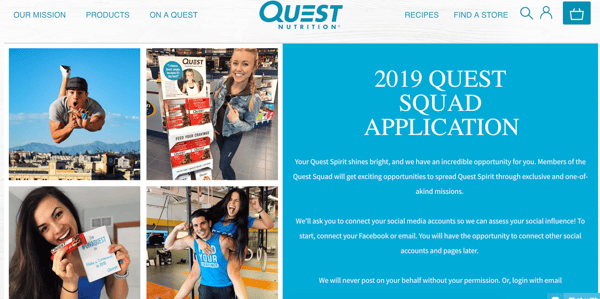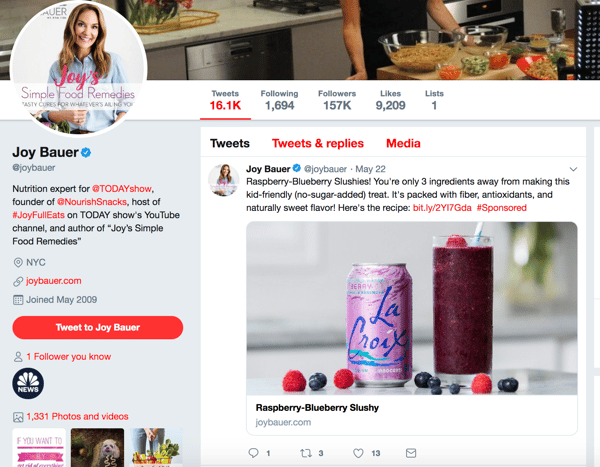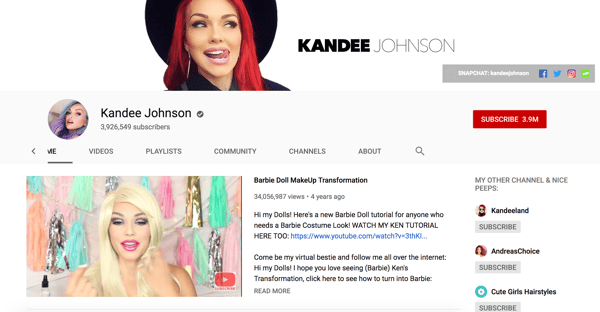What Will Influencer Marketing Look Like in 2020?
Why could a influencer strategy be benefitial for your brand? In this HubSpot article, you’ll discover how influencer marketing is changing and how working with influencers will reach your target audience and boost conversions.
Have you ever purchased something because a well-known person you admire used the product or service?
I’m guilty of this — in fact, I recently bought myself a new waterski because a professional water skier and micro-influencer, Whitney McClintock, shared a video on Instagram of herself using the ski.
I was in the market for a new ski and followed Whitney for quite some time. I figured since she used this particular ski, I should too — if Whitney promotes it, why wouldn’t I love it?
You might be thinking, “Slightly questionable logic, Kristen.” Maybe.
But, did Whitney’s post get me to buy the ski? Oh, yeah. (And I do love my new ski for those of you wondering.)
This is just one example of a tactic used by businesses across virtually every industry called influencer marketing.
What is influencer marketing?
Influencer marketing employs leading, niche content creators to improve brand awareness, increase traffic, and drive your brand’s message to your target audience. These content creators already market to your ideal audience across different channels which allows you to expand your reach across your buyer personas.
Examples of these channels include social media, blogs, columns, digital and print ads, and television. Influencer marketing is increasingly more popular among businesses these days because traditional advertising has become less effective in attracting leads and customers.
Influencer marketing works because it uses tactics like word-of-mouth marketing and social proof, which are now critical aspects of any successful marketing strategy. Customers trust their peers, friends, and people they admire more than the companies selling the products and services they buy and use.
Before we dive into the different types of influencers, let’s review the difference between a brand influencer and a brand ambassador, as they’re often confused terms.
Brand Influencer vs. Brand Ambassador
A brand influencer refers to someone who has a following within a specific niche that they engage with regularly. Because of this, they have the power to impact their purchase decisions. The major types of brand influencers include micro-influencer, celebrity influencer, blog influencer, social media influencer, and key opinion leader. (We’ll define each type later on.)
For example, social media influencer @leximars has worked with Lulus in the past to share different outfits and styles on her Instagram account featuring their clothing and accessories. Lexi tags Lulus in her posts so her followers can learn more about the brand, follow them on Instagram, or click their website link to shop for specific products they see on Lexi’s page.

A brand ambassador is hired by a business to work under contract to help them achieve specific goals: increase brand awareness and boost conversions and sales. A brand ambassador’s contract is typically long-term (several months or even years). During that time, they represent the brand and the lifestyle associated with it and have deep knowledge about the business’s products or services. They don’t necessarily need to be an influencer before becoming an ambassador.
For example, Quest Nutrition’s brand ambassador program requires all interested individuals to apply to their program. Quest looks for individuals who embody their brand, are positive spokespeople for their products, create social media posts to promote their products, and live the Quest lifestyle.
Anyone who fits their criteria can apply and has the potential of being accepted. Applicants aren’t required to have a highly successful YouTube account, thousands of followers on Instagram, or a popular blog to become a brand ambassador.

In this article, we’re going to focus on brand influencers. However, before we dive into the various types of brand influencers, let’s take a look at some important statistics that prove working with an influencer is effective in helping you reach your marketing goals.
Statistics That Show the Value of Influencer Marketing
Influencer marketing is an investment — to get it right, you have to devote time to ensure you find the right influencer to promote content that appeals to your target audience. You also have to spend money and/ or resources to reward the influencer, run various campaigns with the influencer, and more depending on your specific marketing goals.
Luckily, there are many statistics that prove influencer marketing is a worthwhile time and monetary investment as well as show you which metrics are impacted by influencer marketing.
- 80% of marketers say influencer marketing is effective, and 89% say it works just as well (if not better) than other marketing channels.
- 71% of marketers say the quality of customers and traffic from influencer marketing is better than other sources.
- 49% of consumers today depend on influencer recommendations for their purchase decisions. 60% say they’ve been influenced by a recommendation when shopping in-store.
- Google searches for “influencer marketing” grew 1500% in the last three years.
- 48% of marketers working with influencers say audience relationship is the most valuable factor when considering which influencer to collaborate with.
- Influencer marketing strategies focused on branding or engagements generate 8x ROI.
- The top three goals of influencer marketing for businesses include increasing brand awareness (85%), reaching new audiences (71%), and generating sales and conversions (64%).
Types of Influencers
1. Micro-Influencer
Micro-influencers — like Whitney — have a relatively modest following of thousands or tens of thousands of people within their niche. They create relevant content for their audience and communicate with them via social media platforms, blogs, other written publications, websites, and forums.
Due to the size of their following and the type of content they create, they typically have high engagement rates. Having a smaller audience allows micro-influencers to bond with the people who follow them more regularly (as compared to a celebrity with millions of fans) via their channel. This makes them appealing to work with for businesses looking to develop personal relationships among their target audience.
How to Work With a Micro-Influencer
Micro-influencers can be established on a variety of channels. So, once you’ve chosen the micro-influencer you’re going to work with, you can have them write a post about your service, share an online review, or post a picture on Instagram with one of your products. Due to the manageable size of their base of followers, they’ll be able to engage with your target audience on the content they share about your products and brand.
This way, they can answer any questions the audience members may have about your products, communicate their experience with your products, and direct audience members to your website or customer support team if necessary.
Micro-Influencer Example
@sydneyloveleigh is an Instagram micro-influencer who shares content about health, fitness, and travel. She works with an athletic clothing brand, Nuxactive, to promote their products and brand awareness among her 21.4K followers. Sydney fits Nuxactive’s brand image and lifestyle, and her Instagram page has thousands of followers who fit the profile of their target audience — this is what makes her a great micro-influencer for Nuxactive.

In her bio, Sydney shares a code for her followers to use at check out (so Nuxactive can track Sydney’s success promoting their brand), she links to their Instagram page in all of her promotional posts, and interacts with her followers on these posts by responding to their comments and questions and liking their messages.
2. Celebrity Influencer
Celebrity influencers are famous people with large followings — typically in the millions — who are known across many industries. They’re widely recognized and, therefore, have the potential to be very successful in influencing your target audience.
Even if your target audience doesn’t overlap with all of your celebrity influencer’s fans, having them promote and/ or use your product or service is a powerful form of social proof. Since celebrities are so well known, they’re effective at reaching multiple audiences across various channels.
How to Work With a Celebrity Influencer
Since celebrities are so well-known, there are many ways to work with them. You may focus on social media, print or online ads, TV commercials, blogs, or other written publications.
You can ask the celebrity to pose for pictures promoting your products, explain why their audience members would love your products or services, provide coupons and discount codes, or write reviews telling audience members why they stand by your brand. You may even sponsor an event the celebrity is hosting or attending.
Celebrity Influencer Example
Amazon sponsored Khloe Kardashian’s baby shower — with 93.7 million followers on Instagram, a reality TV show, several entrepreneurial endeavors, and a famous family, it’s safe to say many of Amazon’s customers recognize Khloe. By sponsoring her baby shower, they were able to feature their wide range of baby registry and maternity products.

In addition to Amazon publicizing the fact they sponsored the event, Khloe also shared a post on Instagram thanking Amazon for making the party planning and baby registry creation processes so simple. She tagged Amazon in the post and shared a link to her baby registry for her fans (and Amazon’s target audience) to review and shop on their site.
3. Blog Influencer
A blog influencer is someone who writes for their established blog and has thousands, or millions, of subscribers and readers. Their reach and influence set them apart from other bloggers (meaning, they aren’t just writing for themselves or a very small group of people).
How to Work With a Blog Influencer
To collaborate with a blog influencer, you may write a guest post for their blog, ask to be mentioned in one of their posts, or sponsor a post about one of your products or services. If you sponsor a post on the influencer’s blog, you can also provide images of your products for them to share as well.
Blog Influencer Example
A popular lifestyle blog influencer is Hannah Bronfman of HBFIT. Hannah writes about health, beauty, fitness, and creating a life that makes you happy and feel good. Between her blog subscribers, social media following, ads, the book she wrote, and the app she created, Hannah has millions of audience members and fans who keep up with her life.
Her blog features a variety of product, gym, and spa reviews. She collaborated with Face Gym, a local facial studio, on a sponsored blog post about their services and facial treatments.

Hannah included information about the unique studio, facial experience, why her audience members would love the services Face Gym offers, as well as a coupon code for their first visit.
There are also pictures of Face Gym and the services they offer in Hannah’s blog post to give audience members a better idea of what to expect from the studio in terms of services and atmosphere.
4. Social Media Influencer
Social media influencers are well-recognized on social platforms, such as Instagram, YouTube, Facebook, or Twitter, and are followed by thousands or even millions of people. Social media influencers share content about a wide range of topics such as health, workouts, cars, diet, outdoor activities, travel, fashion, art, beauty, and interior design.
How to Work With a Social Media Influencer
Once you find a social media influencer with an established image that works for your brand, posts content you feel complements your products or services, and has followers who are also members of your target audience, you can determine what type of content you’re going to have them promote.
If the influencer is on Instagram, you may have them post a picture with your product and tag your social account. If they’re on Facebook, you can ask them to share a live video of them opening your product and if they’re on Twitter, you can have them write a brief statement about your product and pair it with a picture of them holding it. On YouTube, you may have the influencer share a video of them using your product while explaining the reasons why they love it.
On any social media platform, you can also have an influencer host a contest or giveaway with your products or share coupon codes.
Social Media Influencer Example
Joy Bauer is a nutritionist, health expert for The Today Show, and Twitter Influencer. Her 157K followers and fans on Twitter consist of health-conscious, nutrition-focused individuals who enjoy learning about Joy’s healthy recipes, lifestyle, and diet tips.
Joy worked with La Croix on a sponsored Twitter post featuring a twist on one of their sparkling water drinks. The post directs audience members to a family-friendly recipe on Joy’s website promoting the sparkling water and recipe with images, nutrition information, preparation time, and an anecdote about why Joy loves it.

La Croix identified Joy as an expert in her field with a following of people who fit their target audience. The company worked with Joy to develop this sponsored post featuring professional photos of the product and a recipe that exemplifies the ways customers can put a fun spin on a simple beverage.
5. Key Opinion Leader
Key opinion leaders (KOLs) are high-level experts on a specialized topic within a particular field. For example, a KOL might specialize in makeup application, the Paleo lifestyle, or Bikram yoga. If your business is looking to attract audience members in a very specialized field, a KOL is a great option — due to their expert knowledge on a certain topic, KOLs are trusted contributors in their industries and have followings of people who are also invested in those subjects.
How to Work With a KOL
KOLS, like micro and celebrity influencers, are present on many channels, such as social media, blogs, other written publications (like academic journals), and ads. Therefore, your business has many options for how you decide to work with a KOL.
You might have them review one of your products on YouTube, mention you in their column, write a blog post about your brand, share a post about your product on Instagram, or pose with your product for a print or digital advertisement.
KOL Example
Kandee Johnson is a makeup influencer with over 3.9 subscribers on YouTube and over 1.8 million followers on Instagram. She’s a makeup artist pro — her expert knowledge on makeup application makes her a key opinion leader in the makeup and cosmetic industry. Kandee shares thousands of makeup tutorials, makeup tips and tricks, and product reviews on YouTube and Instagram.

She has shared sponsored content for Boxy Charm — a subscription service that provides customers with a box of several new beauty products every month — promoting their service, as well as her favorite products in the box, among her millions of followers and fans.

Boxy Charm’s target audience includes lovers of beauty products, cosmetics, and makeup which works with Kandee’s huge base of followers. They had Kandee share a post with one of their boxes, describe which products inside she was most excited about, and tag them in her post.
Now that we’ve covered the different types of influencers your business can work with, let’s review how to find these influencers so they can begin helping you reach your target audience.
How to Find Influencers
Identifying the right influencer to work with might seem like a daunting task — so, we’ve put together this list of ways you can use to find the right person to help you improve your brand awareness and reach.
Google Search
The most straightforward way to go about an influencer search is with the help of Google (or any search engine). Remember an influencer is already creating content in your field and reaching your target audience. So, a Google search for industry-related terms and keywords will surface experts in those areas.
Review articles related to various topics in your field, conduct individual searches for people you’ve heard of or know are already high impact contributors, and scan industry-specific sites and web pages for influencers.
Social Media
You can also search for influencers on various social media platforms. Whether or not you’re going for a social media influencer, most influencers will likely have some sort of social media presence — their profiles serve as a great way to learn more about them.
On social, search for keywords and phrases, specific users, hashtags, and tagged audience members on specific posts (brands and social users may have tagged influencers you could potentially work within posts). Don’t forget to look in the comments sections of high-traffic posts related to your industry or type of work as influencers may have posted comments and interacted with members of your target audience there. You can even get some ideas from influencer posts on your competitor’s accounts.
Referrals
Use your current network (professional and personal) to obtain referrals. Look for KOLs on LinkedIn and ask your team if they’ve recently followed any micro-influencers on social who regularly post content that’s compatible with your brand and image. If you’ve worked with any influencers in the past, ask them if they’re willing to connect your business with other influencers they know as well.
Blogs
Reading blogs is another great way to locate influencers — that is, both the blog authors and their sources. Scan for the people mentioned in the blogs. Perhaps the blogger is reviewing their work, mentioned a quote from them, or asked them to contribute to the piece.
Additionally, themed publications (business, art, beauty, or fashion) often do expert round-ups where they feature dozens of influencers. You can research the individual further to determine if they’re a good fit for your business.
Influencer Software
Due to the rising popularity of influencer marketing, various technology and software have emerged to help businesses identify influencers and measure their success.
Two of the most popular options include BuzzStream and BuzzSumo.
BuzzStream allows users to research influencers. As a user, you also can build profiles, review the influencer interactions, measure their success through engagement metrics, and review their contact history.
BuzzSumo allows you to identify key influencers that are popular among your target audience. It also allows you to analyze which types of content perform best for influencers and review the content of your competitors.
Talent Agencies and Agents
If you’re looking to hire a specific celebrity influencer, it’s unlikely you’re going to be able to send them a direct email or give them a call (although that’d be pretty cool). Instead, you’ll probably have to go through a talent agency or work with an agent to determine whether or not that celebrity is willing to work with your brand and for what price.
How to Create an Influencer Marketing Strategy
Let’s dive into how you can create an influencer marketing strategy for your business. This strategy will allow you to manage all aspects of your relationship with an influencer. It’ll also ensure they’re successful in helping you achieve your campaign goals.
1. Determine your campaign goals.
The first step is to create goals for your influencer marketing strategy — these will help you measure the success of your campaign. Think about your objectives in terms of SMART goals.
When working to develop influencer marketing SMART goals, there are three factors to keep in mind: reach, relevance, and resonance. These will help you focus your goals on the different aspects of influencer marketing.
Use a free template to determine your SMART goals.
- Reach is the ability to deliver content to your target audience through an influencer — it helps you improve brand and product awareness. For example, how many people on Instagram are actually seeing the content an influencer is posting about your product?
- Relevance is the level of connection your audience feels to your brand, product, or service due to the work of an influencer — it’ll help you enhance brand loyalty. For example, if your audience sees a celebrity they love and admire with your product, they might begin to feel a strong connection to it, too.
- Resonance is the ability to drive audience members to a specific action because of an influencer’s content — it’s all about impact and memorability. Resonance helps you increase your follower count, drive traffic to your site, and boost conversions. For example, if your audience reads a blog post written by an influencer about your product, they may click on the link in the blog post that directs them to your website so they can buy it.
2. Define your campaign audience.
Regardless of which type of influencer you work with, your target audience will remain the same. Different influencers may have different ways of connecting with your audience, but your business’s overall marketing goals and buyer personas don’t change.
Before moving forward with your influencer marketing strategy, work with your marketing team to develop and learn about your buyer personas. This will help you identify the exact type of customer you’re going after and, therefore, help you determine what type of influencer and content will appeal most to them to ensure your target audience is aligned with that of the influencer.
Learn how to build buyer personas for your business.
3. Set your budget and choose your influencer type.
Based on our review of the five major types of influencers, you should be able to determine which type will work best for your business’s goals and target audience. You should also consider your budget.
For example, if you’re a startup with a low budget, you might choose to work with a micro-influencer. If you’re a mid-sized company with more resources, you might choose to bring on a celebrity influencer or work with a KOL who’s highly-regarded in their industry.
Here are some more details on the average cost of influencers based on the type of work they do. Note that these numbers aren’t set in stone for every influencer.
- Micro-influencer: $80-500 per piece of content
- Celebrity influencer: $3,000-$500,000+ per piece of content (Selena Gomez makes up to $550,000 per Instagram post.)
- Blog influencer: $400-$5,500 per blog post
- Social media influencer: $100-$550,000+ per social post
- KOL: $500-$5,000+ per piece of content
4. Choose your influencer and review his or her work.
Once you’ve determined the type of influencer you want to work with, it’s time to identify the right influencer for your company. We already discussed how to find an influencer, so, let’s cover some other important things to consider when finding an influencer that’s a good fit for your business.
Ask yourself (and the influencer!) the following questions:
- Does this influencer and his or her lifestyle fit my brand image?
- Have they worked with any of my competitors?
- Who is this influencer’s current audience?
- Is my target audience active on the platform/channel primarily used by this influencer?
- Does working with this influencer make sense for my budget?
- Has this influencer actually used any of my products or services before? Are they a customer?
- Does this person have a personality I want to work with?
- What will this influencer expect from me?
5. Develop your campaign messaging for your influencer.
Once you’ve chosen an influencer, it’s time to plug them into your campaign. Work with your marketing team to develop your campaign messaging and determine what content your influencer should (and should not) publish.
Be sure to share your brand guidelines — including details about your brand voice, tag lines, and language to avoid — with your influencer so they can remain on-brand with their content. Remember, whether an influencer posts about your product or service one time or 100 times, they’re still representing your brand and business. Ensure they have the tools to do so accurately.
In this stage, you should also determine whether your influencer will be creating content for your campaign on their own or if you’ll be providing the content for them to post.
Lastly, be sure to discuss how they’re going to help you boost traffic with their content and which target metrics you can expect per post or piece of content.
6. Finalize campaign expectations with your influencer.
Finally, review all of the expectations you have for them in addition to any expectations they have for you. Remember your chosen influencer may have worked with other brands before yours — meaning, they may already have their own processes in place for the way they do business.
Additionally, their expectations are going to differ depending on the type of influencer they are. For example, a micro-influencer is going to have different expectations for the way you communicate with them versus a celebrity. A micro-influencer may speak directly with you whereas a celebrity may have an agent communicate on their behalf.
Lastly, you’ll want to ensure these expectations are written, agreed upon, and signed by both you and the influencer — you can organize all of this information through an influencer contract. This will help you avoid any issues and discrepancies down the road.
To help get the ball rolling, here are some examples of the expectations to review:
- How this influencer will be paid or rewarded (money, swag, discounts, coupon codes, etc.)
- How long you’ll be working together
- How you and the influencer will be communicating with each other
- Any other terms of contract necessary for your specific business to review
6. Reward your influencer.
Influencers don’t work for free. You’ll need to reward them for their work — discuss the form of payment when you review expectations together as mentioned in the above step. There are several ways you can reward an influencer. Here are some examples.
- Money (payment prior to or after the content is created and shared, depending on your agreement)
- Swag (such as clothing, accessories, or product samples)
- Free product
- Access to discount codes and coupons
- Promotion on your website, blog, and/or social media platforms
7. Measure your campaign results.
Lastly, you must measure your influencer marketing strategy results. This is how you’ll determine the level of success you’ve had in reaching your audience with the help of the influencer. You should refer back to the SMART goals you set (as well as influencer marketing metrics) to help you determine whether or not you’ve achieved your objectives.
Here’s more detail on which metrics you’ll want to keep an eye on when measuring your influencer marketing strategy success:
- Engagement: Keep an eye on all engagement involving content shared by the influencer about your brand and products. Engagement includes various interactions such as Likes, shares, Comments, Retweets, Mentions, Direct Messages, and Reposts on channels like social media, blogs, and forums.
- Reach: Determine your reach, or how many people are actually seeing the content your influencer is sharing about your brand, by looking at your overall number of views.
- Resonance: Learn about the level of resonance — or the actions that were completed — by your audience members after they consume and/ or interact with the influencer’s content involving your brand.
- Brand Awareness: Measure your brand awareness among the audience members of your influencer as they begin sharing content related to your brand. There are quantitative — such as direct traffic and social engagement — and qualitative — such as social listening and awareness surveys — ways to measure your brand awareness.
- Clicks: Review the number of clicks on the content the influencer shares about your brand, whether it’s a direct link to your website, a CTA, a social media giveaway, or a signup form.
- Conversions: Calculate your conversions (the number of leads who become customers) as a result of your influencer marketing strategy. You can calculate conversions on your website or through URLs (such as discount/ checkout codes found on the influencer’s social media account or blog) by dividing your conversions by your overall number of visitors.
- Return on Investment (ROI): Calculate the return on your influencer marketing investment by dividing the return (or benefit) by the cost of the influencer marketing investment.
- Follower Count: Track the increase and decrease of your number of social media followers or blog subscribers over time to see whether or not the influencer is helping you boost your follower and/ or subscriber count.
In terms of measuring the success of the influencer’s work, BuzzStream and BuzzSumo both have analytics tools built into the software to help you measure the success of the influencer’s work. These types of software are especially helpful in allowing you to determine ROI from your influencer marketing strategy, which is known to be the most difficult metric to measure when working with an influencer for businesses.
Google Analytics is great if you want to track overall traffic directed to your website and the number of leads converted. The software provides you with a deep look at acquisition, behavior, and conversions related to an influencer and your visitors.
For example, if you ask the influencer to conduct a giveaway or contest, look at the number of people who participated. If you give the influencer a discount code for audience members to use at checkout, look at how many people used it and, therefore, made a purchase thanks to their content. If you provide the influencer with specific URLs with tags to specific posts or landing pages, track their performance by looking at the number of leads directed to those pages via the given URLs.
Now, onto measuring influencer marketing success on social media. HubSpot’s Social Tool can help you pull specific engagement-related data, like reach and interactions, from various platforms. Additionally, the respective social platforms you’re using may have analytics tools built-in as well, such as Twitter Analytics and Instagram Insights.
Do you still need some inspiration for your influencer marketing strategy? Let’s look at three successful strategies implemented by major companies.